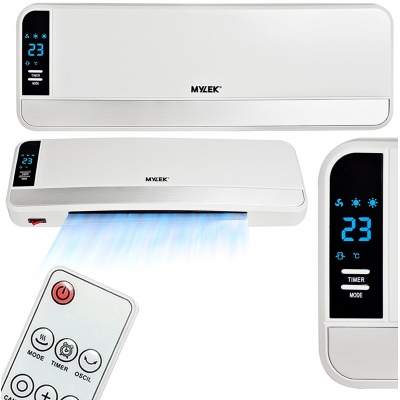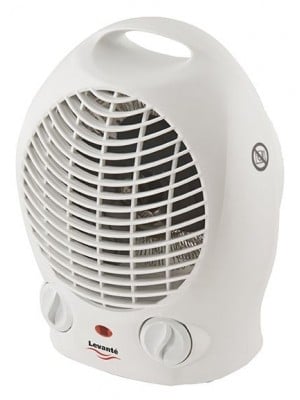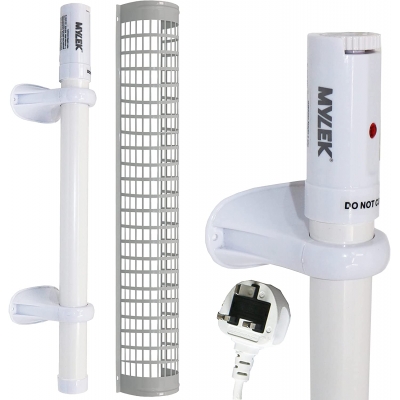
Garage Heaters
These garage heaters will keep your garage cosy no matter what you use it for. Protect your belongings from frost, make it your dream workshop, or make it warmer and more welcoming to extend your living space. With a garage heater, the possibilities are endless!
Which Garage Heater is Right for You?
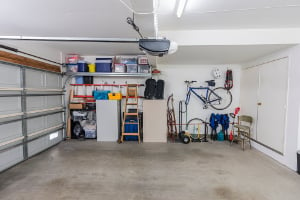 Finding the right heater for your garage depends almost entirely on what you use your garage for. If you simply want to protect it against frost, you’ll want a very different kind of heater than someone looking to convert their garage into a leisure space. To help you make the right choice, just browse the products above or keep reading our garage heater buyers’ guide!
Finding the right heater for your garage depends almost entirely on what you use your garage for. If you simply want to protect it against frost, you’ll want a very different kind of heater than someone looking to convert their garage into a leisure space. To help you make the right choice, just browse the products above or keep reading our garage heater buyers’ guide!
Tubular Low-Energy Heaters
Many people only use their garage for storage. This means that you probably won’t be spending a lot of time in there, so you don’t need to spend a lot of money keeping it cosy. However, if you have no heating at all, the stuff you keep in your garage is at risk from frost, damp, and other issues!
If you want to protect the contents of your garage or shed, a low-wattage tubular heater is best for you. They use an incredibly small amount of energy to put out just enough heat to take the chill out of a room. A tubular heater isn’t powerful enough to keep you cosy, but it will keep the inside of your garage at a more even, very slightly warmer temperature. This will prevent frost, condensation, and damp from forming inside your shed provided your roof and walls are intact.
Electric Panel Heaters
If you actually like spending time in the garage – perhaps you’re doing up a car in there, or you use it as a studio or games room – you’ll want to keep it nice and cosy! Electric panel heaters are a great all-purpose way of doing this. They’re available in a range of sizes and with a variety of features, so you have a lot of options to choose from. Here are a few features you should look out for if you plan on using a panel heater in a shed or a garage.
Size and Weight
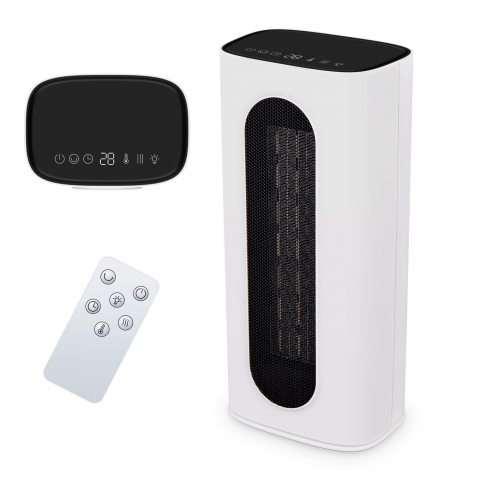 If you plan on wheeling your heater in and out of the garage as required, you’ll want one that’s small and portable. This means you can use it in your garage or in any room in your house, too!
If you plan on wheeling your heater in and out of the garage as required, you’ll want one that’s small and portable. This means you can use it in your garage or in any room in your house, too!
IP Rating
If you plan on leaving your heater in the garage all year round, you’ll want it to have some level of water or dust resistance. You know how well-sealed an electric appliance is by looking at its IP rating. To find out more about this, check out our IP ratings guide here, but the short version is that you should look for models with at least an IP24 rating (at least when it comes to garage heaters).
Energy Efficiency
Whether you use your heater regularly or not, you want it to be as energy-efficient as possible! This is just common sense – whether you use it for 5 minutes or 5 hours a day, you don’t want to pay over the odds for it. Modern panel heaters can include a range of energy-saving features such as thermostats, timers, open door detection modes, and smartphone control. Of course, the more of these features a heater has, the more it costs to buy, so it’s a balance between long and short-term savings.
If you’ve invested a lot of time and money in your garage and you like spending a lot of time in there, you should prioritise getting a heater with as many energy-saving features as you can afford. If you use your garage less often, you might be good with a more basic model.
Power
 This is a simple one – you should always ask whether the heater you want is powerful enough for your garage. A good rule of thumb is that you need 100W of power for every m² to heat a room efficiently. Depending on how well-insulated your garage is, though, this might vary slightly. It’s always better to have slightly more power than you need, just in case – you can always just run the heater on a lower setting if it’s too much.
This is a simple one – you should always ask whether the heater you want is powerful enough for your garage. A good rule of thumb is that you need 100W of power for every m² to heat a room efficiently. Depending on how well-insulated your garage is, though, this might vary slightly. It’s always better to have slightly more power than you need, just in case – you can always just run the heater on a lower setting if it’s too much.
Oil Filled Radiators
If you know that you’ll be spending long stretches of time in your garage, an oil filled radiator is a good choice. They’re filled with a thermally-conductive oil, so they tend to be a bit bigger and heavier than panel heaters, and they do heat up slightly slower. However, this means they tend to retain heat very well, so they’ll cool down much more slowly and they don’t use as much energy to reach their target temperature. That makes a good oil filled radiator a really energy-efficient choice for any garage!
Fan Heaters
If you want a low-cost, no-nonsense option that’ll let you keep warm for less, a fan heater is just what you need! They blow a steady stream of warm air around your garage, so they’re very simple and they tend to be very small. This means you can easily pick them up and move them around wherever they’re needed. It also means they’re very tough and durable as they don’t have many sensitive electrical parts. This is always worth knowing if you use your garage as more of a workshop!
Air Curtains and Overdoor Heaters
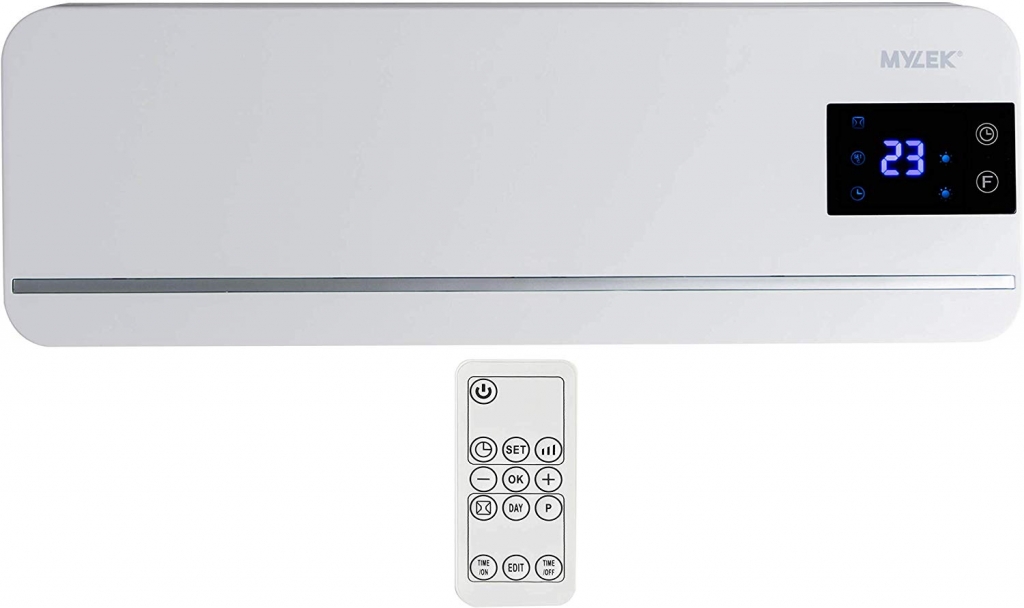 A slightly more advanced version of a fan heater, air curtains need to be wall-mounted above your garage door. As the name suggests, when powered on, they’ll blow a curtain of warm air down just in front of your doorway. This gives you a cosy feeling as soon as you step into the door, but it also forms a sort of barrier which stops that heat from escaping through cracks in your door frame. While you might feel more benefit from them if you’re regularly hopping in and out of the door, they can actually make small garages feel quite cosy after a while!
A slightly more advanced version of a fan heater, air curtains need to be wall-mounted above your garage door. As the name suggests, when powered on, they’ll blow a curtain of warm air down just in front of your doorway. This gives you a cosy feeling as soon as you step into the door, but it also forms a sort of barrier which stops that heat from escaping through cracks in your door frame. While you might feel more benefit from them if you’re regularly hopping in and out of the door, they can actually make small garages feel quite cosy after a while!
Some air curtains – such as the stylish MYLEK models – are sleek and compact, so they can easily fit into small garages. The MYLEK air curtains also let you turn off their heating element, meaning they’ll blow out cold air instead! This is very useful in summer.



